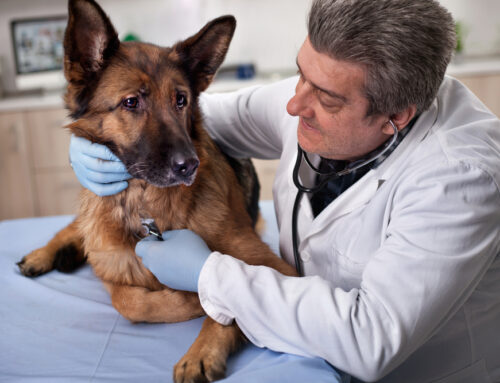Pet dental health is often overlooked, yet it plays a crucial role in a pet’s overall well-being. Many pet owners don’t realize that, just like humans, pets are prone to periodontal disease, a serious gum infection that can lead to pain, tooth loss, and even affect their heart, liver, and kidneys if left untreated. At Guam Pet Hospital, we’re committed to helping you recognize the signs of periodontal disease early, so your pet can stay healthy and happy for years to come.
But how do you know if your pet is suffering from periodontal disease? Let’s explore the signs, causes, and preventative steps you can take to protect your pet’s oral health.
What Is Periodontal Disease?
Periodontal disease is a bacterial infection that affects the gums and structures supporting the teeth. It typically develops in four stages:
- Gingivitis: The earliest stage, characterized by inflammation of the gums.
- Early Periodontitis: Mild gum recession and infection start affecting the bone around the teeth.
- Moderate Periodontitis: Significant gum inflammation, moderate bone loss, and the start of loosening teeth.
- Advanced Periodontitis: Severe gum recession, major bone loss, and loose or missing teeth.
This disease is progressive, meaning it worsens over time if not addressed. Catching it in the early stages can make a significant difference in your pet’s comfort and long-term health.
Signs of Periodontal Disease in Pets
Pets can be quite stoic, often hiding their discomfort. However, there are telltale signs that may indicate your pet is experiencing periodontal disease. Look out for the following symptoms:
- Bad breath: Persistent bad breath, or halitosis, is one of the first indicators of dental problems in pets. While some smell is normal, a strong, foul odor can signal infection.
- Red or swollen gums: Healthy gums are usually a pink color, so redness or swelling may indicate the presence of gingivitis or infection.
- Yellow or brown buildup on teeth: Tartar accumulation can often be seen along the gum line. This buildup is a breeding ground for bacteria that lead to periodontal disease.
- Drooling or difficulty eating: Pets with dental pain may drool excessively or chew on only one side of their mouth. They might even avoid hard foods or treats.
- Pawing at the mouth: If your pet seems to be frequently touching or pawing at their face, it could indicate dental discomfort.
- Loose or missing teeth: As periodontal disease advances, it can cause teeth to loosen or fall out due to bone and gum deterioration.
- Irritability or lethargy: Pets in pain may exhibit changes in behavior, becoming irritable or less active.
If you notice any of these signs, it’s a good idea to schedule a dental checkup. Contact us at Guam Pet Hospital to address any concerns you may have about your pet’s oral health.
Causes and Risk Factors of Periodontal Disease
Periodontal disease is primarily caused by plaque buildup on the teeth. Plaque is a sticky film of bacteria that forms naturally on the teeth and, if not removed, can harden into tartar. Once tartar accumulates, it can irritate the gums, leading to gingivitis and eventually periodontal disease.
Some factors that can increase a pet’s risk of developing periodontal disease include:
- Age: Older pets are more susceptible to dental issues as years of plaque buildup take a toll.
- Breed: Small dog breeds, such as Chihuahuas and Toy Poodles, are more prone to dental problems due to their small mouths and crowded teeth.
- Diet: Soft, wet foods can contribute to plaque buildup more quickly than dry kibble, which may help reduce tartar.
- Genetics: Some pets are genetically predisposed to periodontal disease, regardless of diet or oral care habits.
While some risk factors are beyond your control, preventive care can greatly reduce the chances of periodontal disease affecting your pet. Visit our Pet Dental Health page to learn more about the importance of dental care for pets.
Preventing Periodontal Disease in Pets
Preventing periodontal disease is much easier than treating advanced cases. Here are some simple steps you can take to protect your pet’s teeth and gums:
- Regular Brushing: Brushing your pet’s teeth regularly is one of the best ways to prevent plaque buildup. Use a pet-specific toothbrush and toothpaste, as human toothpaste can be harmful to pets.
- Dental-Friendly Diet and Chews: Certain foods and dental chews are designed to reduce tartar and support oral health. Crunchy foods and dental treats can help scrape away plaque, keeping your pet’s teeth cleaner.
- Routine Checkups: Regular dental checkups with your veterinarian can catch signs of periodontal disease early, before they become painful or require advanced care. At Guam Pet Hospital, our team can help keep your pet’s teeth and gums healthy with routine cleanings and exams.
For more information on preventive care and other services we offer, visit our Services page.
Why Pet Dental Health Matters

Oral health is closely linked to a pet’s overall health. Without proper care, bacteria from periodontal disease can enter the bloodstream, potentially leading to serious conditions affecting the heart, liver, and kidneys. By taking steps to prevent or catch periodontal disease early, you are not only protecting your pet’s mouth but also supporting their long-term health and happiness.
Remember, dental pain can impact a pet’s quality of life. Imagine the discomfort you’d feel if you had a constant toothache but couldn’t explain it to anyone. Pets rely on their owners to recognize their needs, so keeping an eye on dental health is one of the most caring things you can do for them.
Schedule a Dental Checkup Today
If you’re wondering whether your pet might have periodontal disease, it’s always better to be proactive. At Guam Pet Hospital, we offer thorough dental examinations to help catch and address any dental health concerns. Regular checkups can ensure your pet’s teeth and gums remain healthy and pain-free.
Ready to schedule an appointment? You can easily request an appointment online or contact us directly to discuss your pet’s dental needs. Our team is here to help answer any questions and guide you in maintaining your pet’s best dental health.
By prioritizing your pet’s dental health, you’re taking an essential step toward ensuring they enjoy a long, healthy, and happy life. Don’t wait—book a checkup today!








Leave A Comment